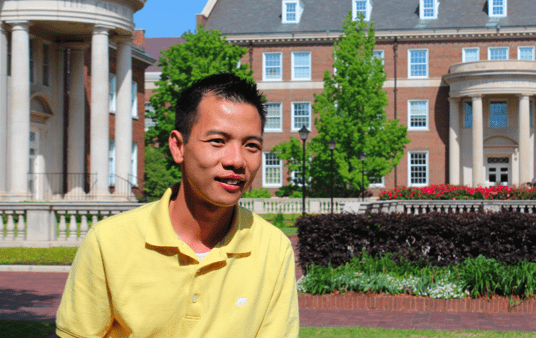
Senior Michael Tran stands outside of SMU’s Cox Business School. (Abril Murillo)
With a Starbucks cup in one hand, Michael Tran, an international student from Vietnam, begins to tell his story. He is a senior at Southern Methodist University majoring in applied mathematics.
He has overcome the language barrier and the culture shock. He has adapted to the fast pace way of living in the United States and has excelled in his studies, but to him this is not enough.
“My parents are entrepreneurs, and they have inspired me a lot. I always wanted to do something that will inspire them the way they did to me. So, getting into business is a big jump that I am trying to make,” said Tran. “However, it won’t become a reality as long as I do not have enough paper work to start my business.”
According to Open Door’s Statistics, Tran is one of 15,000 students from Vietnam here in America. From 2011 to 2012, the number of international students in the U.S. increased 5.7 percent to a record high of 764,495 students.
Out of those students, more than half went back to their countries in less than eight weeks, and less than 4 percent stayed longer than a year. Without proper paperwork, Tran will find himself part of that statistic even though he wants to set himself apart as one in thousands.
As an entrepreneur with a natural ability to recognize solutions for others, Tran hopes that a proposed federal entrepreneur visa will soon be passed. The visa will allow him to stay in the U.S. once he completes his studies and pursue his entrepreneurial dreams.
He is full of ideas. As he was visiting Chicago, in June 2012, he became aware of a problem in the region. The Asian carp had overpopulated the lakes, becoming a pest. The government was already investing millions in trying to control the Asian carp population.
However, for Tran, this problem could be turned into a business, which could also help combat starvation around the world.
Through the Engaged Learning program at SMU, which allows students to learn beyond the classroom and tackle real world issues using the tools of the program, Tran began researching this issue.
He spoke to several experts in the area and gathered enough information to make a business plan. As outlined in the Engaged Learning Blog, this plan proposed capturing the Asian carp to turn it into fertilizer and edible products for both humans and animals.
“Currently, Asian carp are used to produce fertilize [mostly] and most of Americans have not yet accepted Asian carp as a food supply. However, there is a huge market for Asian carp elsewhere such as Asia or Africa. If we can make a nice product out of Asian carp, it will pay off all the expenses that the government has spent on killing them,” said Tran.
With the profits, Tran believes that a humanitarian food aid for starving countries can be created.
For Susan Kress, the director of the Engaged Learning program, Tran’s project has proven how outstanding he is.
“He is one of those people I hope I can hear from in the future because I know he will make a real contribution to this country,” she said.
Kress acknowledged that many international students come and study, and quickly and quietly return to their countries without being remembered. But she said that Tran “is a model international student. He won’t be forgotten and he is not invisible.”
Another project that Tran has started is a business plan to launch a smoothie shop. One of Tran’s business partners named it “Smoochies, a kiss of nature.”
The business will offer a product made of a 100 percent natural fruits and vegetables that will be safe and healthy for people with diabetes.
Quin Neal, with the American Diabetes Association, sent an email to Tran saying the association showed their support for his project. The group even offered to provide dietician information twice a week to his future customers.
Neal said, “I am seeing an increasing demand for healthier foods and more options being asked for by the customer.” He believes Tran’s venture might be on the right track.
On the other hand, Simon Mak, the associate director of Entrepreneurship at SMU, was a somewhat reluctant about this project because he believes Tran’s success is in a different area.
“With Michael’s electrical engineering and advanced math degrees, I actually encouraged him to pursue something that is more unique to his training – a growth oriented business based on STEM (science, technology, engineering, mathematics), which will create more sustainable and high paying jobs,” he said.
Nonetheless, he described Tran as proactive and very focused, “he knows what he wants and pursues it aggressively,” said Mak.
Therefore, he decided to support Tran by teaching him how to write a basic business plan and showed him several training YouTube videos.
“He did a very good job over three weeks,” said Mak.
Tran recently submitted his business plan in TCU’s Business Plan Competition called “Values and Ventures.” Before he competed, Tran was more interested in making connections for funding than the $15,000 prize.
However, funding is not his biggest concern. His biggest concern is time. His international student visa will expire as soon as he graduates and he will be forced to go back to Vietnam.
He decided to apply for graduate school to extend his visa and continue working on his project, but that extension can only last so long. Therefore, he is actively seeking a way to obtain an entrepreneur visa.
Last February, several lobbyists gathered in Washington to ask for a new entrepreneur visa for people that wish to create companies here in the United States.
Thanks to their efforts, the Start Up Act 3.0 bill was introduced. This bill would create a new entrepreneur visa for foreign-born innovators, aimed at encouraging highly skilled STEM immigrants to stay in the country.
Passing this bill will allow startups to create an average of three million American jobs each year. Some of the biggest startups are companies such as Google, Yahoo! and eBay, which were founded by immigrants.
However, due to the recent terrorist attacks in Boston, all immigrant-proposed bills are being re-evaluated to make sure they won’t pose a threat to the national security.
Tran, still holding the Starbuck’s cup made with international ingredients, can only sit and wait for a new hope that will allow him to pursue his dream.
“If one day, the entrepreneur visa becomes a reality for foreigners like me, it would make my dreams come true. America is the land where you want to build your dream. Someone has told me a quote, and I always kept that in my mind, ‘If you don’t build your dream, someone else will hire you to build theirs,'” said Tran.









